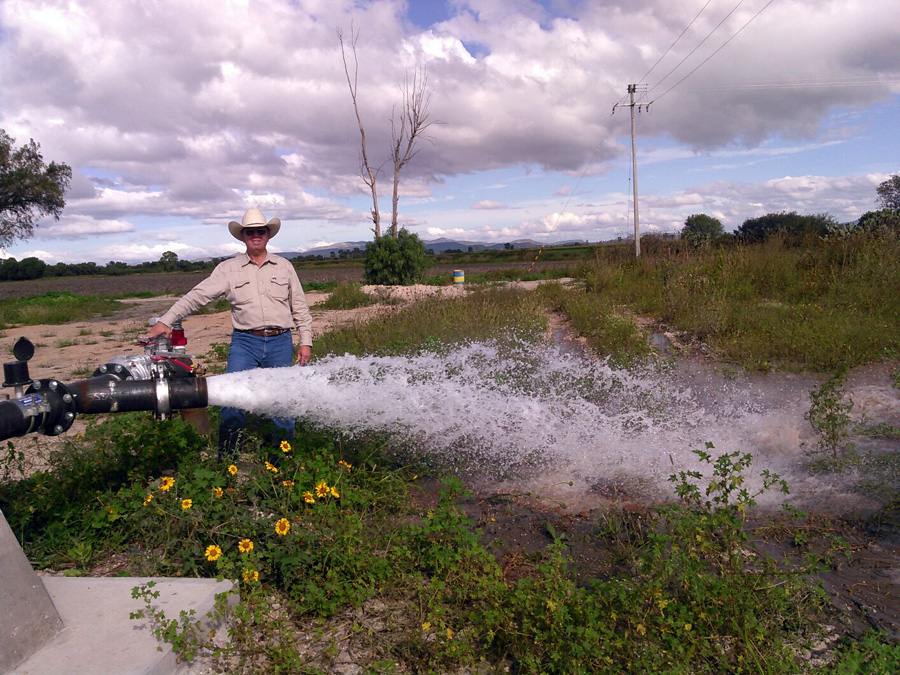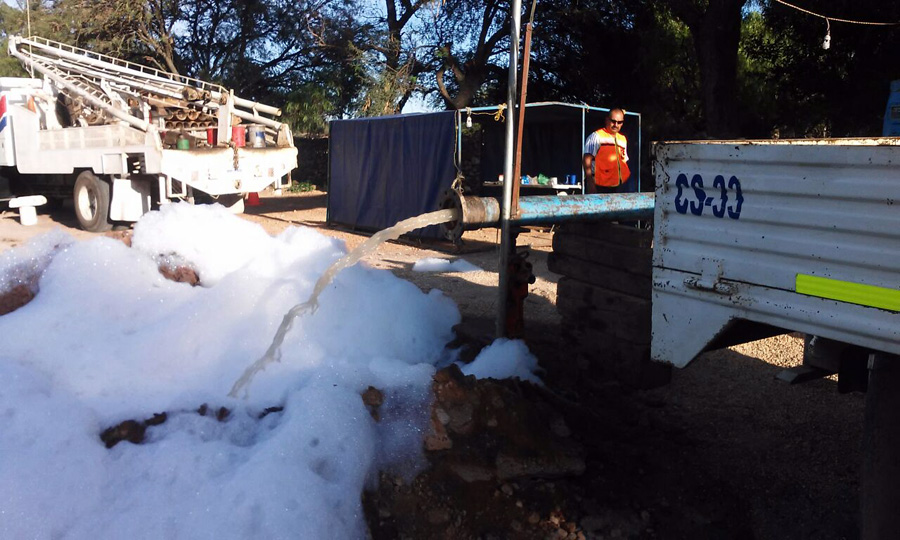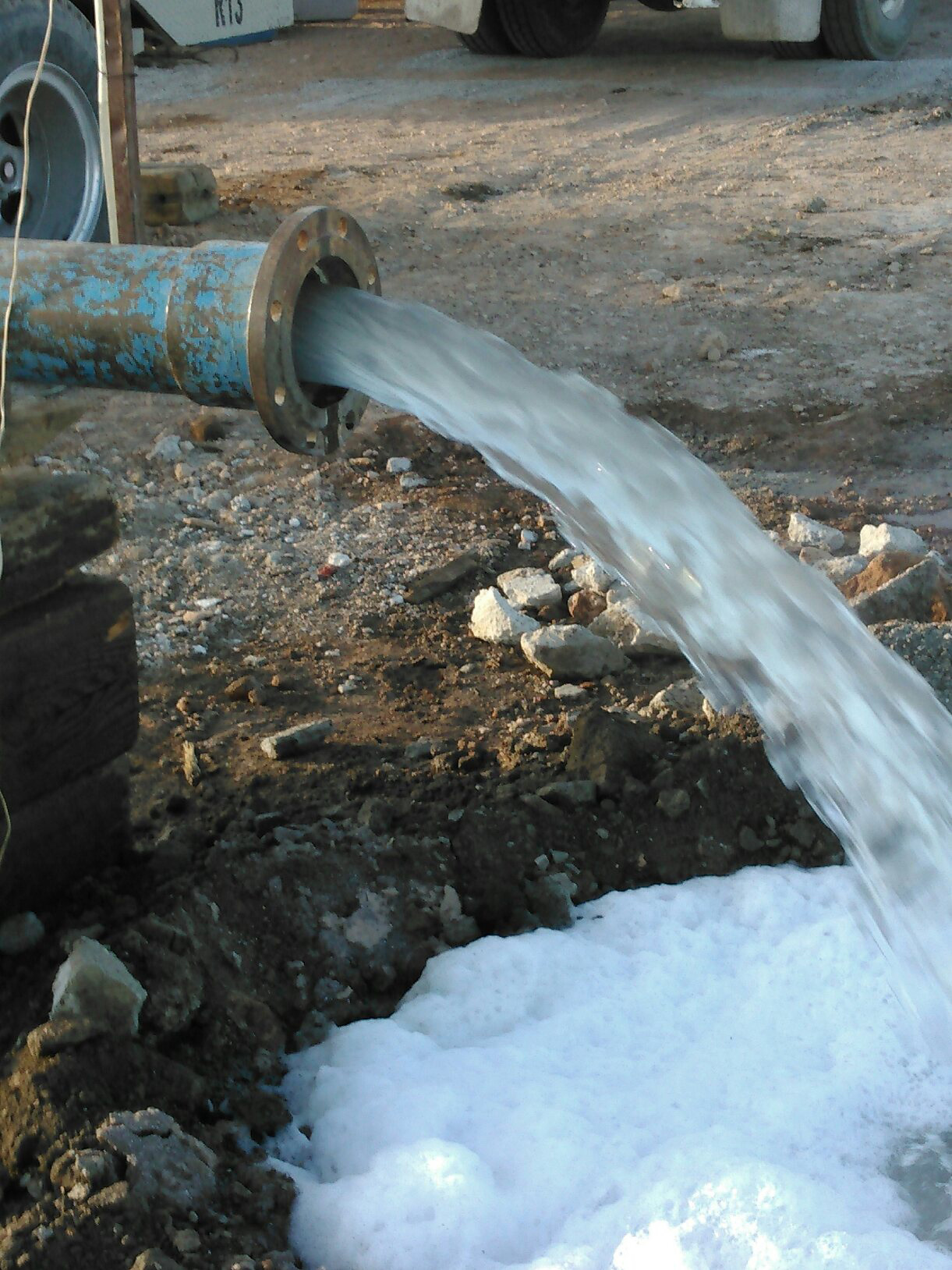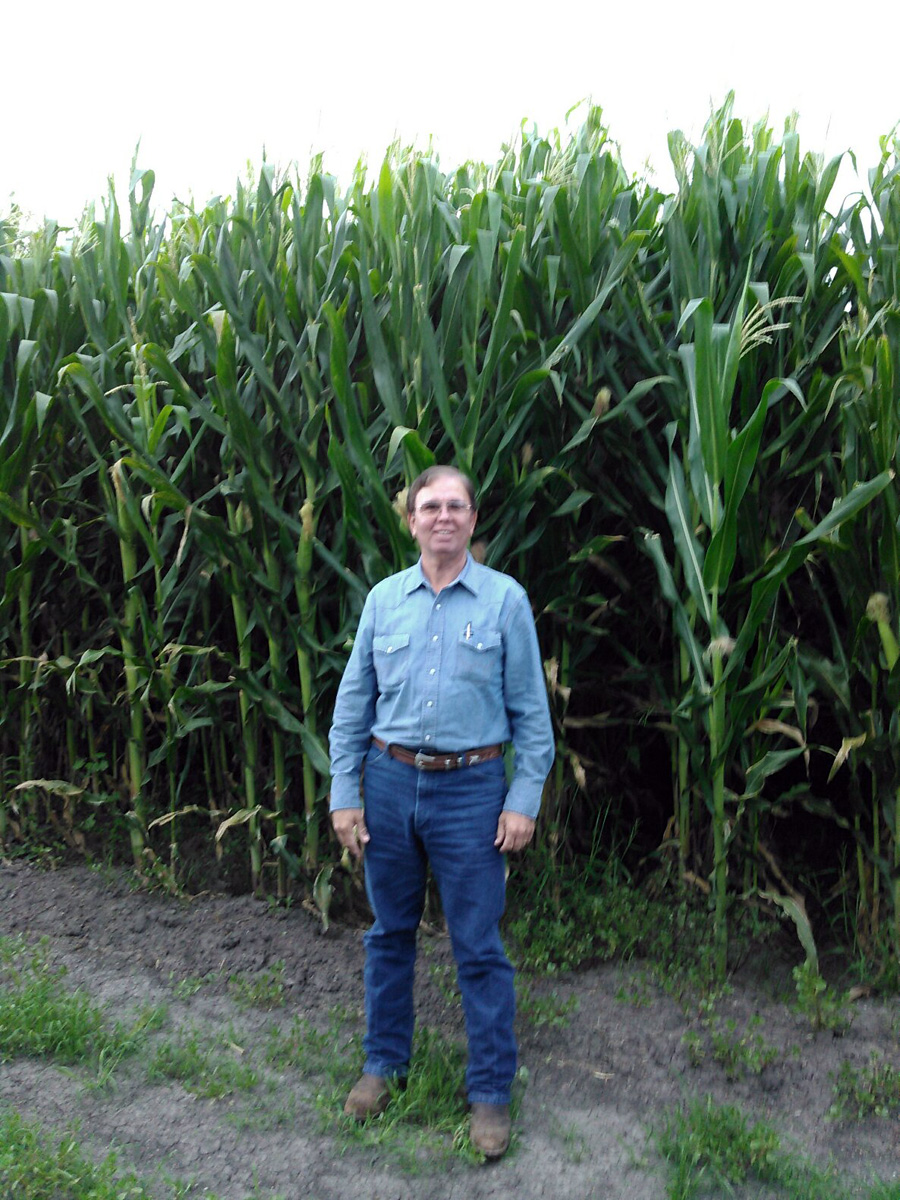I ran into my friend Jaime Gonzalez, a water dowser and a jet pilot, just before the holidays. He shared photos of a phenomenal fresh water well he had recently marked and drilled near Guanajuato.
The well, which now services 20,000 acres of farm and ranch land, came in at 1,000 gallons per minute. Fields of corn, hay, and sorghum benefit from this bounty, as will every living thing on its food chain.
Jaime’s knowledge of water and his abiding reverence for its ability to change lives and landscapes is inescapably enthralling and inspiring.
Think about what his gift allows him to understand — something we hardly consider — the hydrology of underground rivers and how to tap into them.
I’ve included below a story I wrote about him in April 2013.
South Texas water dowser:
changing lives and landscapes one ranch at a time
The detail is not lost on me. Jaime Gonzalez, a corporate pilot whose day job keeps him in the firmament above, is so grounded that his avocation — one that changes lives and landscapes — allows him to see underground rivers and veins of water below the sand and hardpan of the parched South Texas brush country.
Gonzalez is a dowser who uses neither rods nor branches to locate water. He relies on a sixth sense he attributes to “a gift from God” and a sensitivity to electromagnetic currents.
I met Jaime Gonzalez at Chick-Fil-A on Loop 20 for a cup of coffee we never remembered to order. A couple of hours later the owner of the restaurant kindly brought us one. As I talked to him, I had the thought that I could not possibly bring to a story the intensity with which he speaks about water or how he finds it.
He shared the story of being on his grandparents’ ranch in Mexico, how they ranched without ready access to water, that he flew his first plane as a seven-year-old and knew he would be a pilot, that he grew up in California but returned to Laredo to finish junior high and high school. In the decades that followed, Gonzalez began his family with his wife Estela Gonzalez and became a pilot.
He eschews publicity, does not sing his own praises, and does not say anything that takes away from the real matter at hand — finding water and helping those who need it. You have only to speak to some of the ranchers who have benefitted from his gift to know how seriously he takes his mission to find water, how good he is at it, what they’ve observed happens to him when he finds it, and what happens to them in the eureka moment that the miracle, the gift of life, gurgles and sprays from the desert floor.
Meme Ortiz is one of those ranchers. Now 80, Ortiz hauled water for 39 years — twice a week in the summer, once a week in winter — to the southeastern Webb County ranch that is his home off Wormser Road in southeastern Webb County, “We had heard about Jaime’s work, and when we met him we were very confident he could help us,” said Ortiz, a retired Southwestern Bell installer. “He drove on to our property, waved hello to where we stood greeting him, and then drove past us. When he stopped his truck and got out, he said, ‘The water is under your house.’”
Ortiz said a well was drilled to Gonzalez’s specifications about 90 feet from the house. “I left it all to him. Right away we trusted him and his knowledge of the drilling sands, where the good water would be, where to cement the well, what driller to use,” he said.
The well was completed in mid February of this year, bringing with it a host of life-changing positives.
“It changed our landscape and how we run our household,” said Joyce Ortiz, Meme’s wife, of the advent of sweet, potable water. Gone from their lives are the time-costly trips to haul water 1,200 gallons at a time. “There is no more having to worry not to run out of water, though by now I am very cautious and do not waste water,” she said. The oak trees she and Meme planted 12 years ago have come back as has other greenery on the property. They have planted a plot of calabacita, no doubt the sweetest they will ever taste.
Alejandro Rivera, the owner of an oilfield service company, recalls meeting with four different water well drillers to get an idea for how to bring water to his Mangana Hein Honeycomb Ranch about 18 miles east of U.S. Hwy. 83.
“All roads led us to Jaime Gonzalez. My brother’s father-in-law said he knew this amazing guy that could find water. So Jaime comes out to the ranch, and we walk with him through the brush. Jaime started sweating a bit and he said, ‘It’s right here. The water is here.’ By now he is trembling, and I am having some kind of experience of my own. I make it to the truck and I faint,” Rivera recalled of the day Gonzalez marked the well site.
“It was as he said. Sweet water, lots of it, enough for the house and the animals, enough to plant and cultivate three acres of squash and melons, enough to fill the two lakes we have and the third one we are digging,” Rivera continued.
Rivera was on-site the day the well came in. “I’ve never seen anything like that before — a blue gusher of water, a lot of screaming and hollering at the blessing that would change everything for us,” he said, adding that because the well was an expensive proposition, he has been selling water to his neighbors. “They don’t have to drive as far as the county facility to load water and they are getting cleaner, chemical-free water,” he said.
“I’ll have water to sell to the oilfield when it comes back around this way,” Rivera said.
Near Rivera’s newly arrived good luck, Dickie Salinas and his brothers Abelardo and Benny of El Brasil Ranch are irrigating a 65-acre field of Haygrazer in Year Four of one of the worst droughts in history.
“A well had been drilled here in the early 1940s and there had been a little corral around it to mark it, but it was now pretty much lost to time and memory. Like everyone else, we’ve lost our tanks to the drought and to the reality that our September-May rain cycles are off. Things looked terrible,” Salinas said, “Until Abie met Jaime Gonzalez as they were exiting a bank.”
According to Dickie Salinas, as Gonzalez stepped from his truck onto the soil of El Brasil, the dowser said he could sense where the water was. “His face turned red. He said, ‘There’s water behind your house.’ I’d never seen anything like this before. He marked the well, and thanks to his gift from God, we have water.”
Salinas describes Gonzalez as “down to earth, a man who knows his stuff.”
Rancher Larry Puig of San Juan Ranch, which is located in northern Webb County near the mid-point of the 22.7-mile Camino Colombia, concurs.
“We’ve lived with wells that produced 13 to 15 gallons a minute with a small horsepower pump. My father knew we had water, but we didn’t know we could produce it to the extent that we have. We now have all the water we need, excellent water, water enough to fill the craters excavated for the soil base for Camino Colombia,” said Puig.
The San Juan well that Gonzalez marked produces 200+ gallons per minute. “The water came in at the full capacity of the six-inch pipe,” Puig said, adding that they are recovering the cost of the well by selling water for highway construction and road improvements as well as to the oilfield.
“I was never skeptical that Jaime could find water. He believes in what he does, and he has a sincerity and a passion for his work. The advent of this kind of water on the ranch is an important footnote to the history of this ranch,” he said.
Justo Leyendecker said that Gonzalez has found water on both of the ranches he owns with his brother James, one off U.S. Highway 59 and the other just south of Encinal off Interstate-35.
“He came across a humongous vein of water on the IH-35 property — wide and deep. He found good water. We did exactly as he instructed — which driller, the casing, the pump, how to position the drilling rig over the site. Jaime was there supervising, looking at the drilling sand samples the driller left for him. He knew where to cement the bad water. He knew the depth at which the water stopped. If he says it stops at 1,147 feet, that’s exactly where it stops,” Leyendecker said, adding, “We have a well that produces 600 gallons a minute. We have filled a dry lake. Our property values have increased.”
Leyendecker recalled the travails of an oil company that had drilled a water well about two miles south of his IH-35 property. “It was in line with our well. They didn’t get much volume and tried different pumps to change the outcome. After the third pump, they called Jaime,” he said.
“Jaime Gonzalez is an amazing man. He can find water no matter what. The experience of working with him was unbelievable. When he is locating the site, he starts getting red in the face. He goes to the deepest part of the vein,” Leyendecker said.
“You can’t tell Jaime Gonzalez’s story without pointing out that within 700 yards of the county operated water well at Las Lomas, a source of poor quality water, that he found excellent clean water,” he added.
Gonzalez said trust, “with a capital T,” between him and the landowner is one of the most important factors that influences a good outcome.
He sent me a text about how water dowsing works, that it is a sensitivity to electromagnetic fields. He said it is a skill that does not call upon psychic powers, that its success comes from experience, concentration, a sixth sense, and magnetic susceptibility. And that above all, his text read, it is a gift from above.
“I myself don’t understand everything about this gift,” he said. “I know it is about energy, and that experience makes you better at it. All my thinking is about water. I take notes all the time,” he said, pulling a small graph paper notebook filled with meticulous notations for locations and depths, not just about the wells he’s marked and has drilled, but about the landscape he traverses. He may not have yet met the rancher he’s about to see, but he knows that rancher’s property is three cattle guards off the highway.
“Oil and gas producers call me from time to time, but it’s the ranchers and those without water that I most want to help,” Gonzalez said. “I don’t take any shortcuts. I tell the pump installer to use Schedule 120 PVC and brass couplings in between. I take this job very seriously and believe it should be done right from the beginning,” he said.
The closest I got to Gonzalez acknowledging in any way his role in the miracle of making good water flow where none had, was to elicit the observation, “It’s amazing when the terrain goes from black and white to high definition.”
Gonzalez finds no comfort in global water statistics for pollution and availablity. “Worldwide there are contaminated lakes and rivers. Our water situation is worse than it ever has been — 40 percent of the world’s population has little or no water, and that worsens day by day. The exhaust of cars and trucks and factory emissions fall to our surface water and become part of it,” he said.
He recalled a telling conversation with an Air Force pilot in 1982. “There was very little in the way of bottled water in the market at the time except what came from Europe. He told me that a bottle of water would one day be more valuable than a can of soda. We’re there. Water is our future,” he said.
(Jaime Gonzalez can be reached through his website stxwaterdowserservice.com or by phone at 956-206-9045)







Wonderful article about a good man! I met Jaime Gonzalez when I worked at airport.
God has given him this talent to help others. Amazing man.